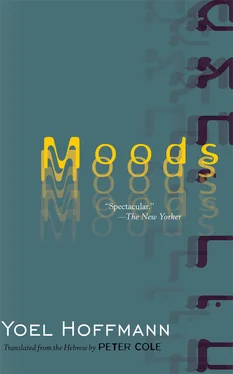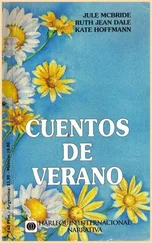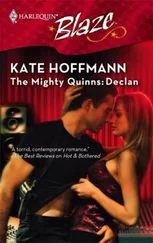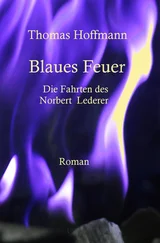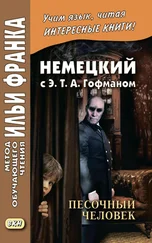Some people bow before nothing. Or plead to what’s beyond the world to come and save them.
Whoever goes to hell goes to hell. Who’s saved is saved. What do we know? Maybe far beyond the world, in a place unreached by the oldest starlight, a teddy bear sits and no one knows. Or a narcissus. Who doesn’t get drunk on their scent?
We can now reveal to the readers of this book a deep secret, but they’re not allowed to reveal it to readers of other books.
Feet follow one another. Hands cut through the air. The mouth opens and closes. The inner organs expand and contract, according to their nature. What’s outside is standing or walking.
Prayers can be heard everywhere, whether a person says them aloud or not. Frogs need only themselves. The marsh reeds know the right direction.
And because these things are set forth here, it’s a wonder this book is sold for so little.
[102]
Here we would like to introduce a new character. The landlord at 7 Nahalat Shivah Street, in Tel Aviv.
His name was given to him a day or two after he was born. They made meatballs and invited guests. The crystal dishes came out of the sideboard.
When he got bigger he rode on the tram, and at the Gymnasia he wore a hat with a visor. Now he’s already old, and whenever he goes down a staircase he groans.
This is the man. His neighbor in the building next door (number 9) suits this chapter better. Readers can see (if they hide in the courtyard) how she goes down the stairs with the garbage. When she returns to her apartment she places different pots on the stove.
These two, granted, are minor characters, but they’re major minor characters.
[103]
The words falsification of corporate documents frighten us. Maybe we’re also committing such a crime. On the other hand, books like these can hardly be thought of as corporate documents, and we do our best not to lie. Witness the previous chapter.
Other writers lie all the time. They play around with names and change dates and whatnot. We, however, lied only with regard to the girls we had a crush on in fifth grade and sixth grade, because they’re married now (though some are widows) and we’ve already seen how one of their husbands looked at us.
Writers should be brought to trial not over things like that but for inflicting boredom. There should be a clause about that in the criminal code. We, too, are sometimes guilty of this.
Imagine for a moment that we’re found guilty of inflicting boredom on our readers and we’re thrown into prison and sit there among the crime families. On second thought, that’s better than sitting in Tel Aviv at fancy stores like the Bookworm.
[104]
Here we can relate the sly doings of Mrs. Shtiasny and her Italian husband and Mrs. Minoff and my stepmother Francesca, and how they traveled to the Rukenshtein Pension in the hills of Safed.
In those days no one traveled by taxi more than a few streets, and this only when something dire was involved. Nonetheless, they went by taxi, something that gave rise to considerable grumbling in the Austrian old age home. (They were accused of being haughty, wasting money, and the like.)
As a kind of punishment from on high (this is how the others saw it), Mrs. Shtiasny’s Italian husband almost fell out of the taxi when he tried to slam the door while it was moving. To this day, some of the Arab elders of Acre remember the wondrous sight of a taxi passing through the Old City and the back door suddenly opening and a tall Jew being shot from it like a shell being fired from the barrel of a cannon and two women holding his legs and pulling him back inside.
At the Miron Junction Mrs. Minoff tried to slam the broken door and the whole thing happened again. That is, the door opened wide because of the wind and Mrs. Minoff tumbled out and was pulled back in by Mrs. Shtiasny and her Italian husband.
At the pension itself Mrs. Shtiasny’s Italian husband suffered a bout of sleepwalking and wandering into Mrs. Minoff’s room. But this we’ve already alluded to elsewhere.
[105]
From this incident with the taxi the readers can learn of the difference between fabrication (which we call fiction) and life.
In literature (which is to say, fabrication), the incident of the open taxi door would have occurred just once, as the author wanted only to refresh the readers’ faith in the realism of the narrative. But in life? Life is full of great wonders, and things like this happen two or three times, much to the consternation and dismay of writers of a realist bent.
And another thing. A realist wouldn’t have brought in my stepmother Francesca, since she wasn’t really involved in these events. But in life? In life she sat beside the driver (whose name was Abramov) the entire trip, and the front doors of the taxi were fine. Details like these aren’t mentioned in stories.
[106]
And another thing. We’ve heard about scholars of literature, but we haven’t heard of scholars of life. Which is to say, people study one thing or another (like tissue or behavior). But life?
Scholars of literature, for instance, walk around within life. Maybe one needs to examine life from the perspective of those scholars. Once we knew a scholar who took medicine for various illnesses. We need to get to the root of all illnesses in order to understand life, and not to examine them one by one. Maybe there’s a crack within them opening between the living soul and the crust that surrounds it.
Sometimes scholars of literature convene committees and there you can see flashes (like the flickering of the Northern Lights) of very sad things. A tie. Lipstick. Or the papers of the committee’s agenda left behind in the hall after everyone has left.
[107]
To this day we don’t understand why over the butcher shop in a Welsh village it says FAMILY BUTCHER. Maybe it refers to an ordinary store (that sells meat to housewives). In any event, we read the sign as though it was run by someone who slaughters families.
And apropos butchers. In Arab Nazareth we saw a sign in the window of a butcher shop on which it said WE SPEAK NORWEGIAN.
Signs like these lift our spirits. Like the names of banks in Portugal and Spain: BANCO ESPIRITO SANTO (which is to say, Bank of the Holy Spirit) or even the sign YOSEF AZRIEL ATTORNEY AT LAW AND NOTARY PUBLIC. Once we saw, in Herzliya, beside the highway a big sign that said FUNN & CO. — REAL ESTATE BROKERS.
Generally speaking. The government should put signs on everything. They should put the sign HOUSE on every house and TREE on every tree and so on. This way we’d be better oriented. Maybe it should send a plane up into the sky to write out, in white smoke, the word WORLD.
[108]
We’d like to recommend Undencil. This is an excellent antifungal cream (for irritated skin). You can apply it between your toes or in the genital area and the itching vanishes instantly.
If readers have any advice to offer us about how to treat bladder irritation, we’d be grateful to them for that. They can write to us c/o the publisher or the township of Ma’alot, and the letters will be forwarded. We can also advise the readers how to lower their blood pressure by means of (the human) spirit (not the one that hovers over the face of the earth).
Generally speaking. Authors should display greater generosity toward their readers. But real generosity. Not like in certain places, where computers are stuffed with the dates of birthdays and spit out greetings on the right day.
We’d like to embrace all our readers. Men, women, the elderly, and children.
[109]
For what is man if not Uncle Shamu. Don’t we all, in one way or another, wear a wide-brimmed hat and jump into the sea?
We should call all things by their first names. All dogs. All frogs. All trees. Once upon a time we took pity on a gourd that the gardener wanted to uproot, and so we called it Simcha.
Читать дальше
